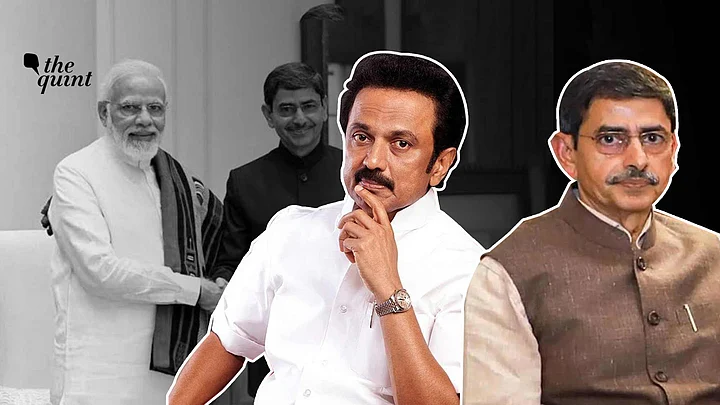Tamil Nadu Chief Minister M K Stalin, on 26 April said that the governor of the state should merely do a "postman's job and send the (anti-NEET) Bill to the President." This was said a day after the state's Legislative Assembly passed a Bill to clip the governor's power over appointment of state university vice chancellors.
“That the governor is refusing to do a simple postman’s job is unbecoming of the post he holds,” Stalin remarked.
The CM's acerbic comments came amid a protracted battle between Tamil Nadu Governor R N Ravi and the state government over the former’s refusal to act on pending Bills passed by the Assembly. The ruling Dravida Munnetra Kazhagam (DMK) has been maintaining that the state is heading towards a "constitutional deadlock." The governor needs to be recalled, the party has been insisting.
Experts: ‘Bigger Fights Were Fought, No Constitutions Deadlock’
While experts agree that the governor is “not within his powers to delay Bills,” they, however, do not think that Tamil Nadu is headed towards a constitutional deadlock.
“For one, the state had witnessed a more serious battle between the governor and the chief minister. For the first time in the history of independent India, a governor granted sanction to prosecute a serving chief minister,” senior journalist R Mani recalled.
The governor at the time was Chenna Reddy and the chief minister was J Jayalalithaa. On 1 April 1995, Reddy gave permission to Subramanian Swamy to prosecute Jayalalithaa.
“On 27 April, the Madras High Court dismissed Jayalalithaa’s petition against this. She went to the Supreme Court and got it ( governor's prosecution order) stayed.”R Mani, Senior Journalist
Mani said that the current tussle too may drag on as the governor is in no mood to relent. “But I doubt if we will have a constitutional deadlock.”
Day-to-Day Affairs May Get Affected
While NEET is a contentious Bill, there are many other Bills which needs to be passed for economic revival and generation of jobs in the state. “By not acting on those Bills, the governor is actually derailing the progress of the state,” Mani said.
The governor’s office however has refuted such allegations and maintained that the governor has only been doing his duty. In a rare interview to BBC Tamil service, the governor said that Raj Bhavan had sought explanations for Amendment to Cooperative Societies Bill and Amendment to Bharathiyar University Bill, but has not received any communication from the government.
“Except for the money Bills, the governor is allowed to send other Bills to the President only when he is completely satisfied with it. There is no pressure of time limit on the governor’s office over sending the Bills.”Governor RN Ravi to BBC Tamil
Sources said that the governor had earlier promised to send the NEET Bill to the President but has now decided otherwise.
“It could either be a mere communication gap or ego clash, but whatever is happening does not augur well for the state” says a Tamil journalist privy to the affairs of Raj Bhavan.
DMK Not Happy With Governor’s Remarks
Apart from the delay over Bills, some remarks of the governor have not gone down well with the ruling party.
In March, at the convocation of Chennai's Tamil Nadu Veterinary and Animal Sciences University, the governor said that India’s development paradigm has fundamentally changed with Prime Minister Narendra Modi’s “all-inclusive development.” He called the earlier model of development the ‘Darwinian model” where a small group cornered great benefits leaving the rest behind.
The DMK was also not happy with Governor Ravi’s remark that India will “fulfil Mahatma Gandhi’s dream of Ram Rajya.” The party found the remark an affront to the Dravidian model that it represents.
‘Governor Cannot Act Independently’
Senior lawyer K M Vijayan referred to a national trend where the central government has been appointing favourable people in states. He said, “The Centre does want to have its own people to run the show. This is an attack on federalism.”
Vijayan said that the governor cannot reject a state government proposal even if it were not legislatively competent. "He should forward it for Presidential advice.”
Recently, the Supreme Court too observed in A G Perarivalan case, “the governor’s reference of the Perarivalan remission plea to the President, especially when the council of the ministers of the state of Tamil Nadu had already sent in its recommendation, would set out a bad precedent and strike at the heart of the federal structure envisaged by the constitution.” Perarivalan was convicted in Rajiv Gandhi assassination case but successive state governments in Tamil Nadu have been supporting his release based on his mercy plea.
In the wake of trouble between the elected state government and the governor, former judge of Madras High Court Justice K Chandru said that federal polity should be preserved.
“Certainly, there must be a change prescribed under the constitution to redefine the role of the governor. The demand that the states must have a role in the appointment of governor is certainly a demand based on democratic foundations,” Justice Chandru said.
(At The Quint, we question everything. Play an active role in shaping our journalism by becoming a member today.)
